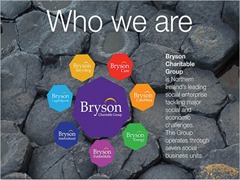Maximising the social economy
 Hugh Crossey, Chair of the Bryson Charitable Group, reflects on his role and the challenges facing the sector.
Hugh Crossey, Chair of the Bryson Charitable Group, reflects on his role and the challenges facing the sector.
Social enterprise was recently described as having the potential to be one of the most exciting business innovations in the last 300 years.
This is how Sir Tim Smit, one of the founders of the Eden Project in Cornwall described social enterprise when he spoke at the Bryson Conference in October, and I have spent the last two years at the heart of one of Northern Ireland’s leading social enterprise while previously having spent over 30 years working on both public and private sector projects with PwC.
So does this description fit?
Over the last two years, the Bryson Group has experienced some fantastic achievements including a Queen’s Award; UK Private Business Award and an Ireland Excellence award. During 2012-2013, the group secured new contracts to the value of £27.6 million. However like the public and private sectors, social enterprises are not immune from the harsh economic climate that currently exists. More worryingly while we hear words of support for social enterprise, we are seeing evidence of protectionism creeping into public service delivery contracts.
This is a concerning trend for all social enterprises and the independent sector, which is contrary to the reform agenda being articulated by many of our politicians. We need our Government to truly embrace social enterprise, work with us to unlock its potential and invest in its growth as it does for other parts our economy.
Bryson is long-established and has had a proud history of being an incubator for innovations and ideas since its inception. We have been taking calculated risks to ensure we are doing our best to help the most vulnerable individuals and communities in our society.
Our CEO, John McMullan, recently spoke at the NICON conference to a broad range of health and social care professionals and he stated that “business as usual is not an option anymore”. We need to encourage and unlock innovation in the delivery of ‘fit-for-purpose’ and ‘cost-effective’ public services and we need true cross-sectoral supply chains working to tackle the major social, environmental and economic challenges we face today.
 In Bryson, we see a future for new delivery and funding models which may be cross-sectoral, not just public, private partnerships but voluntary, public, private partnerships – more fit-for-purpose, more flexible, and more focused on economic and social impact.
In Bryson, we see a future for new delivery and funding models which may be cross-sectoral, not just public, private partnerships but voluntary, public, private partnerships – more fit-for-purpose, more flexible, and more focused on economic and social impact.
The ‘third’ sector has led the way in shifting from a grant-aid structure and culture to the more innovative social enterprise model. Organisations like Bryson contract with commissioners for service delivery not to make profits but to invest in service enhancement and to radically improve social impact. We see a future with significantly more opportunity for social investment from Government, philanthropy and ethical investors that will drive innovation and deliver even greater social impact.
This change is happening much quicker across the rest of the UK. We are seeing a greater diversity of socially driven business models: mutual, co-operatives and social enterprises but in particular public sector ‘spin-outs’ and that’s a development conspicuous by its absence in Northern Ireland.
Northern Ireland spends £3 billion annually to procure public services. Tender competition is focused almost exclusively on price and quality and regardless of the rhetoric surrounding procurement, price tends to be paramount.
This needs to change. We need to move to a process that recognises social impact – we should not just be judged on price or quality but on maximising the social impact on the lives of the most vulnerable and deserving in our society. Embracing that concept really would make social enterprise one of the most exciting business innovations in the last 300 years.
Follow our CEO on twitter @johnatbryson






